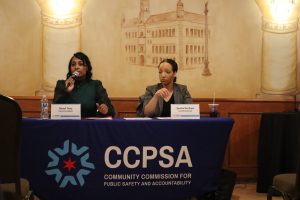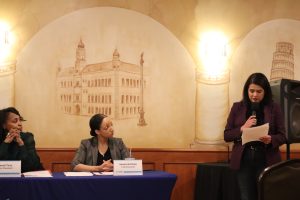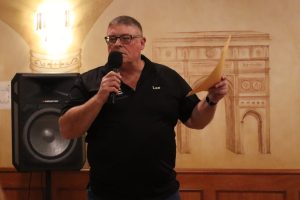Traffic-stop reforms get chilly reception
By Igor Studenkov For Chronicle Media — March 12, 2025
Remel Terry (left) and Sandra Wortham, commissioners with the Community Commission for Public Safety and Accountability, preside over a Feb. 20 hearing in Chicago’s Garfield Ridge neighborhood. (Photos by Igor Studenkov/for Chronicle Media)
Members of a Chicago police oversight board got an earful from retired police officers, elected officials and citizens at a public hearing on potential changes to Chicago Police Department policy on traffic stops.
The Community Commission for Public Safety and Accountability was established in 2021 as part of a larger police accountability reform package. One of its powers is to review CPD policies, and it must work with CPD to develop changes. The potential traffic stop policy change came out of a discussion on whether that’s something that should fall under the Chicago Police Consent Decree.
While that question hasn’t been settled, CCPSA spent the past few months researching changes to the traffic-stop policy. The Feb. 20 hearing was held at European Chalet Banquets in the Garfield Ridge neighborhood — a Southwest Side community that’s home to a large number of city employees.
Most speakers urged CCPSA to keep the traffic stops policy as is, arguing that weakening it would make the city unsafe. Several speakers felt that the commission already made up its mind, and that their feedback wouldn’t matter — which Commissioners Remel Terry and Sandra Wortham, insisted wasn’t the case.
The next hearing will be held at 6:30 p.m. March 19 at Tilden High School, 4747 S. Union Ave. in the South Side’s Canaryville neighborhood.
How CPD conducts traffic stops, and whether Black and Hispanic drivers are stopped at higher rates than white drivers, has long been a concern.

Ald. Silvana Tabares, 23rd Ward, addresses CCPSA commissioners during the hearing.
According to the data compiled by the Office of Inspector General, between February 2024 and February 2025, 6,580 traffic stops involved white drivers, 22,814 traffic stops involved Hispanic drivers, and 55,171 stops involved Black drivers. Assuming each stop represents a separate person, those numbers represent 0.7 percent of Chicago’s white population, 2.9 percent of the city’s Hispanic population, and 7 percent of the city’s Black population, respectively.
OIG reports also looked at the race of the police officers making the stops. During the same period, 43.79 percent of the stops were made by Hispanic officers, 39.09 percent were made by white officers, and 9.34 percent were made by Black officers.
CCPSA released an online survey and held three hearings before Feb. 20. In contrast to the most recent hearing, they were held in majority-Black communities on the South and West Sides.
Several elected officials spoke at the Feb. 20 hearing. Local Ald. Silvana Tabares, 23rd Ward, talked about how, after the 2023 Mexican Independence Day celebration along the Archer Avenue corridor turned rambunctious, she worked with the Office of Cook County Sheriff to step up enforcement when 2024 celebrations rolled around.
“You know what didn’t happen? Mayhem on Archer Ave,” Tabares said. “This neighborhood was quiet and peaceful.”
That, she said, wasn’t an isolated example of how traffic stops made her ward safer.
“I’ve seen first-hand, when people come through our neighborhood, people think twice about committing a crime,” Tabares said. “It keeps this neighborhood safe. If there are issues regarding traffic stops, the answer is not (restricting) officers from doing their jobs.”

Lee Bielecki, 22nd Police District Council member and retired police officer, speaks out against proposed changes to the Chicago Police Department’s traffic-stop policy while vouching for CCPSA commissioners Remel Terry and Sandra Wortham.
The police reform package that created CCPSA also gave each Chicago police district an elected three-member council to work with police and other entities to improve public safety. Mark Hamberlin serves on the council for the 8th District, which includes Garfield Ridge and much of the Southwest Side. He said that, as a Black man, he sees no issue with traffic stops as they are.
“I’m going to tell you — if you get rid of the traffic stops, everybody is going to need concealed carry,” Hamberlin said.
Lee Bielecki is a retired police officer and a district council member for 22nd Police District, which includes Mount Greenwood, a Far South Side neighborhood that’s home to one of Chicago’s highest concentration of police officers and firefighters. While he supported keeping traffic stops as is, he also praised Terry and Wortham and insisted that they could be trusted.
“These are probably two of the hardest-working commissioners on the commission,” Bielecki said.
John Catanzara, the president of Fraternity of Police Lodge 7, a labor union representing rank-and-file CPD officers, grew up in Garfield Ridge, and he said that he spent much of his career in the 8th District. He said that restricting traffic stops in any way would leave more illegal guns on the streets and put more people in danger.
“There will be more incentive for criminals to keep doing what they do,” Catanzara said. “Everybody is going to start looking over their shoulder.”
He insisted that “the system is not broken,” and that adding restrictions “would handcuff the officers even more.” Catanzara also argued that the issue was overblown due to the March 11, 2024, incident when Dexter Reed was pulled over for reportedly having tinted windows. According to the Civilian Office of Police Accountability investigation, Reed initially cooperated, but he ended up shooting at the officers, who returned fire.
“These criminals have no care for anybody, including police,” Catanzara said.
Rabbi Michael Ben Yosef, a regular commenter at police oversight and reform related meetings, pushed back on that, arguing that Reed could have been arrested.
“Why can’t we (African Americans) be arrested? That’s the question,” he said. “Why can’t we be read our rights? Why can’t we have a day in court, like the shooter at Highland Park?”
“He surrendered!” an audience member exclaimed.
Barbara Ziegler, a beat facilitator at the 8th District, said she was “in favor of keeping the traffic stops,” but she would be open to improving officer training.
“We need the offenders who are driving around here with warrants back in the (justice) system,” she added.
The two commissioners insisted that they were there to listen.
“We can’t make the decisions, and we can’t say we speak on the (perspectives) of people we never came to hear from,” Terry said.
Wortham said that, while what they heard at the other meetings might have been different, their goal was to hear from as many Chicagoans as possible.
“There are lots of opinions on traffic stop,” she said. “Our goal is to hear them all. That’s our job.”







